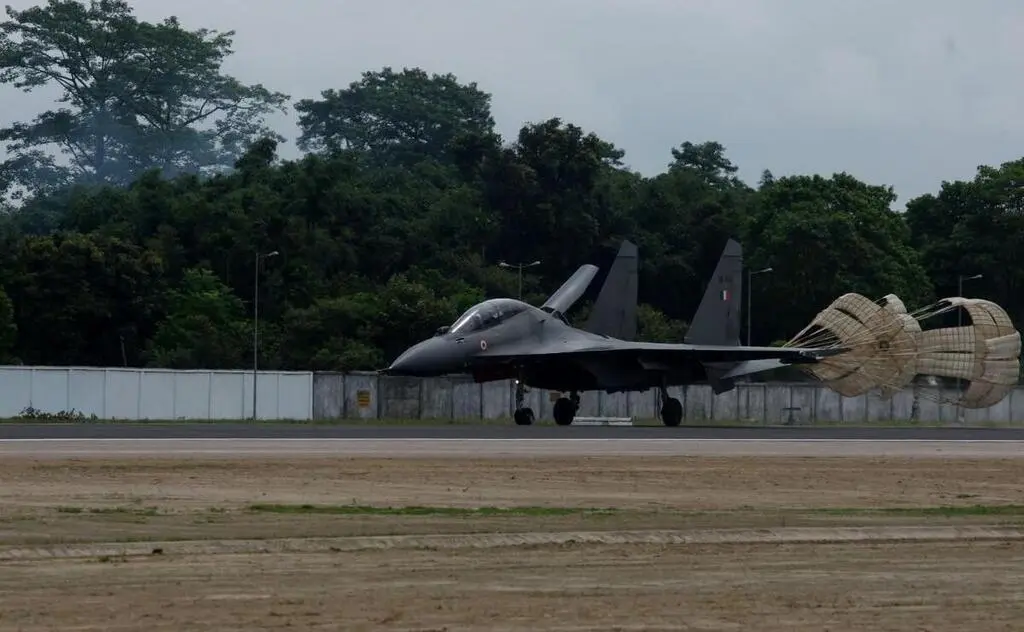In a significant development for the Indian Air Force (IAF), the Indian government has approved the procurement of 240 Russian jet engines to power its Su-30MKI fighter jets. This move, confirmed on September 2, 2024, aims to strengthen India’s aerial capabilities amidst growing regional tensions. The deal underscores the long-standing defense partnership between India and Russia, signaling a deepened strategic cooperation.
Strengthening India’s Air Power
The Su-30MKI fighter jets are the backbone of the IAF’s combat fleet. These multi-role aircraft have been a part of the Indian arsenal since 2002, playing a crucial role in maintaining air superiority. The recent approval for acquiring 240 jet engines from Russia is expected to significantly enhance the operational readiness of these jets.
The engines in question are the AL-31FP turbofan engines, designed and developed by NPO Saturn, a Russian aerospace company. These engines are known for their reliability, power, and ability to perform in various combat scenarios. The procurement deal will ensure that the IAF can maintain its Su-30MKI fleet for the foreseeable future, addressing concerns over engine wear and tear due to extensive use.
Why This Procurement Matters
The decision to procure these engines comes at a time when the geopolitical landscape in the region is rapidly changing. India faces security challenges on multiple fronts, with neighboring countries expanding their military capabilities. The Su-30MKI jets, equipped with the new Russian engines, will be better positioned to respond to these challenges.
Moreover, the procurement also reflects India’s continued reliance on Russian defense technology. Despite efforts to diversify its defense procurement sources, Russia remains a key supplier to India, particularly for critical military hardware. This deal is another testament to the strong defense ties between the two nations.
The new engines are expected to not only replace the older ones but also provide enhanced thrust and performance. This will improve the Su-30MKI’s ability to engage in both air-to-air and air-to-ground missions. Additionally, the upgraded engines will likely extend the service life of the aircraft, reducing the need for frequent overhauls.
Impact on India’s Defense Strategy
The Su-30MKI, with its Russian-built engines, forms a crucial part of India’s defense strategy. The aircraft is versatile, capable of performing a variety of roles, from air superiority missions to precision strikes. With the new engines, the IAF will be better equipped to carry out its missions with greater efficiency and effectiveness.
The procurement is also significant in the context of India’s efforts to modernize its military. The IAF has been focusing on upgrading its fleet to maintain a technological edge over potential adversaries. The inclusion of new engines in the Su-30MKI fleet is a step in this direction, ensuring that the aircraft remain combat-ready in the years to come.
Furthermore, the deal will have implications for India’s indigenous defense manufacturing sector. HAL (Hindustan Aeronautics Limited), the Indian aerospace company responsible for assembling the Su-30MKI, will play a key role in integrating the new engines into the aircraft. This will provide a boost to the domestic defense industry, contributing to the government’s ‘Make in India’ initiative.
The Road Ahead for India-Russia Defense Relations
This procurement deal is expected to further cement the defense relationship between India and Russia. Over the years, Russia has been a consistent partner in India’s defense modernization efforts, supplying a wide range of military equipment. The Su-30MKI itself is a product of Indo-Russian collaboration, with HAL manufacturing the aircraft under license from Russia.
The deal also comes at a time when Russia is looking to expand its defense exports. Facing economic sanctions from the West, Russia has been keen to strengthen ties with traditional allies like India. The procurement of 240 engines is a win-win for both countries, providing India with the necessary technology and Russia with a crucial export opportunity.
Additionally, the deal could have broader geopolitical implications. As India continues to engage with both the United States and Russia for its defense needs, it will need to carefully navigate its relationships with these global powers. The procurement of Russian engines highlights the balancing act that India must perform as it seeks to maintain strong ties with both Russia and the West.
A Strategic Move for India
The approval of 240 Russian jet engines for the IAF’s Su-30MKI fighter jets is a strategic move that will enhance India’s military capabilities. This procurement not only ensures the continued operational readiness of the IAF’s most important fighter jets but also strengthens the defense ties between India and Russia.
As the IAF prepares to integrate these new engines into its fleet, the move will likely bolster India’s air power, providing a crucial advantage in maintaining regional security. The deal reflects India’s commitment to modernizing its military while maintaining strong strategic partnerships with key global players.
In the long term, the procurement could serve as a model for future defense collaborations between India and Russia, paving the way for more advanced technology transfers and joint ventures. For now, the focus remains on ensuring that the Su-30MKI jets are equipped with the best possible engines to meet the challenges of the future.
Key Takeaway: The procurement of 240 Russian jet engines is a significant development in India’s defense strategy, highlighting the importance of the Su-30MKI fighter jets in maintaining air superiority and the continued relevance of India-Russia defense relations.
